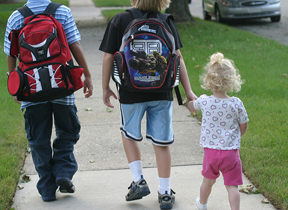Most of the kids walking down my street to the nearby high school this past week travelled in groups of two, three or four, with occasional outliers making their way solo. Of the elementary-school kids passing by, most walked with adults or were delivered to the school door in the family minivan.
Recently, in the U.S., young kids playing or walking outdoors without attending adults have prompted calls to police and child services.
The incidents have sparked discussion around the world about parenting styles. Is granting kids a measure of trust and responsibility a form of neglect? Does coddling kids lead to maladjusted adults?
On a recent Canada-wide radio show, experts stated that Grade 8 was a good age to allow children to walk one kilometre by themselves to school or to walk home from the bus stop without being met by a responsible adult. Two of the panel members then defined Grade 8 kids as being 11 or 12 years old. As far as I am aware, most 11 and 12 year olds attend grades 5 to 7.
The revised ages seem to apply to the school kids walking along the street by my house in the mornings.
Now, I must disclose that I have no kids. I have been told this automatically strips me of any right to opinions regarding parenting or other people’s offspring. Regardless, as somebody neither personally nor emotionally involved in this issue, I find a number of ironies in the debate.
Proponents of letting kids range freely under distant, discreet supervision have identified that the world, in general, is safer for kids today than it was 20, 30 or 40 years ago, when kids were controlled to a far lesser extent, and most suffered no harm. Bad things can happen today, but most child abuse or kidnap cases occur at the hands of trusted family members and acquaintances—now, as then.
Also, learning gurus are now saying learning occurs best through doing and individual exploration. This would suggest kids, like adults, need to be challenged to accept age- and maturity-appropriate responsibilities in order to grow and mature. They need some freedom to explore, dream and problem solve on their own—even if only in the fenced-in backyard.
The question is, what is “appropriate”? I’m sure bad parents exist out there, but every parent I know of does the best he or she can by her kids in a complex, demanding world. Parents’ judgment, and occasionally angst, underlies each decision and choice.
Another irony is that kids restricted to caregivers’ schedules tend to be less physically active. According to U.K. researchers, a child’s body mass index at age five predicts fairly accurately whether he will grow into an overweight adult. So, if a person’s basic values are set by age 12, as psychologists have determined, kids must be physically active throughout their earliest years—even if fully escorted and supervised—in order to set a healthy mold for later years.
Unfortunately, tying kids to caregivers’ availability to provide active escorts to school or to be within a few dozen metres anytime a child is outside may prevent much of the physical activity needed to set healthy life-long patterns.
Yet another irony is the number of parents who post family photos online—geotagged and named—without restricting who may view them. A friend told me she looked up one of the most extreme critics of the free-range kid movement, and within minutes found out how many kids this person had, their names, how old they were, what they looked like, where they went to school, where they lived, and so on.
That seems to be like bolting the patio and basement doors, and yet putting a big ol’ Welcome mat outside the unlocked front door. It invites any stranger who is passing by to come in and rummage around, check out your kids, and fry up some eggs in the nude in your kitchen while you’re upstairs having a nap.
It’s creepy.
But that’s my childless opinion.
—30—
A version of this editorial appears in the September 13, 2015, Victoria Times Colonist.






You must be logged in to leave a reply.